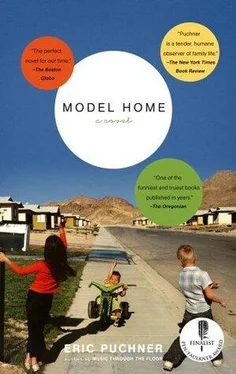“What difference does it make?”
“Our son has disappeared.”
“So I shouldn’t smoke,” she said, scowling.
“Jesus, Camille. Our fucking house burned down. What do you think it does to Dustin, to see you lighting up all the time?” Warren closed his eyes suddenly and clapped his hand to his chest. His face seemed to go still and careful, focused on the air right in front of it, as though he were walking through a cobweb.
“Are you all right?”
“Fine,” he said, wincing. “Just heartburn.”
Camille had a moment’s fantasy that he’d drop dead. That she’d wished this, even for a second, shocked her deeply. She sat down in the dirt. They had not brought water or even hats. Her throat was so parched she couldn’t swallow. Warren dropped his hand from his chest, slowly, and came over and sat beside her. He was wearing the same clothes as yesterday, his T-shirt splotched with grease. His breath reeked of coffee. She remembered the times they used to go camping in Wisconsin when they were first married, how she would use Warren’s long underwear top as a pillow, dizzy with the miracle of his scent.
“It’s my fault,” he said finally.
“No, it isn’t. I blamed him, too.” Camille started to cry.
“Everything will be fine. He’ll come back by tomorrow.”
She could not tell whether he actually believed this. If he wasn’t as hope-dead as he seemed, there might be some way to love him. A tiny feather was stuck in his beard; it touched her strangely. She picked it out, her stomach growling loud enough to hear. Warren reached into his pocket and pulled out a piece of string cheese still wrapped in plastic. He peeled open the plastic and tore the cheese down the middle, offering a droopy white stalk to Camille.
“I forgot to eat breakfast,” she said, taking it. “Where did you get this?”
“From the fridge. Jonas insisted on buying it.”
The cheese tasted like rubber. Camille devoured it.
“Remember when we lived in Chicago?” he said. “Living off frozen moose meat?”
She didn’t say anything.
“We made up those jingles, remember?”
“Don’t,” Camille said.
“Need a last meal? Date with the chair all booked? Ask for Moose Helper, and your moose is cooked!”
He wasn’t smiling. If anything, he looked a bit crazed. It was as impossible to imagine them like that, goofy with love, as it was for their younger selves to have imagined this: sitting in the blistering desert, eating their missing son’s cheese.
Later, without admitting to giving up, they drifted back toward the house, Camille leading the way in her sandals. A hawk circled overhead, coasting on black-fingered wings. Camille turned to look behind her: Warren’s strides, so big and unstoppable before, had slowed to a limp.
“What’s wrong?”
“I twisted my ankle. Rushing to an interview.” He looked at the dirt. “I had the wrong address, which is why I was late.”
There was that strange blush again, the eagerness to explain. Camille remembered how insane she’d been last summer, suspecting him of having an affair. She’d dumped urine in his coffee. Now, watching his blush deepen under her gaze, suddenly positive that he was seeing somebody else — her delusion made real — she found that she didn’t care. Their son was gone. They made it to the back deck and Warren paused, staring at the steps.
“I need your help,” he said quietly.
Camille put her arm around him and helped him up the stairs, surprised by the flabbiness at his waist. He leaned into her like an old man. They reached the top of the steps, sharing his weight, but he didn’t let go right away. She allowed this to happen — invited it, in fact. She’d failed Jonas as much as Warren had; they had this at least in common. She looked at the sky, but the hawk had already captured its prey or given up looking. There was nothing but blue.
Hector stared at the walls of his room, the same ones he’d stared at since he was seven, blank except for the hardened pieces of Blu-Tack stuck everywhere like gum. At night he could hear giant roaches climb up the walls and nibble at the tack, a peaceful rustling. He’d taken all the chameleon posters down, sometime last year, and had never bothered to put anything else up. He was not a seven-year-old. He was a grown man, the manager of a pet store. He was supposed to be at the store right now, not staring at the walls, but his stomach hurt so badly that he’d called in sick. Probably it was a lie for him to say he was ill, though he couldn’t imagine going to work.
He’d called Dustin that morning, to check in, and his mother had answered on the second ring, breathless from running. She’d seemed angry that it was Hector. That’s when he’d learned about Jonas. Missing, no word at all, for three days. The stomachache had begun soon afterward, like an allergic reaction.
Eventually he got out of bed and padded barefoot into the living room, making sure there were no Madagascar hissing roaches under his feet. He’d spent over a week’s wages on an exterminator, not to mention $64 on a motel room for his mom and grandmother, but the fumigation hadn’t worked. The roaches were still around. The exterminator, an old man with thirty years in the business, had jumped when Hector showed him one of the roaches climbing the window, which should have tipped him off from the beginning.
“We’re still infested,” his mother said now, addressing him in Spanish. She’d gotten fatter recently: the bracelets on her arm no longer clinked. “Fourteen years in this house, I never had a single cockroach problem!”
“I’ll find a different exterminator,” Hector said. “Today.”
“How much did he cost, the first man?”
“I’ll pay for it, Mama. I already said I would.”
“With what? Your Jungle of Pets salary?” She looked down at the floor. “You’re never here anymore. I looked at your Visa bill yesterday… where on earth are you going, to spend all that money on gas?”
He shrugged. “Wandering between the winds,” he said in English.
“What?”
“Out. In the desert.”
Hector walked into the kitchen to fill up Ginger’s water bottle, clutching his stomach. The last thing he needed right now was a lecture. His grandmother was squatting in the middle of the room, hissing at the plastic cutting board on the counter. A giant cockroach sat there quietly, refusing to hiss back or even raise its head, its mahogany abdomen large as a toe.
“He’s back!” his mother said, following Hector into the kitchen. “That’s the one that lives under the toaster.”
“Actually, it’s a female. Males have little horns.”
“I don’t care!”
“I’m just telling you.” He pointed at the roach’s abdomen. “See, her egg sack’s about to burst.”
His mother put her hand to her mouth. Hector turned on the sink and filled up Ginger’s water bottle, which caused his grandmother to mysteriously stop hissing.
“Do you love me, mijo ?” his mother said.
“Yes, Mama,” he said seriously. “I do. I’m sorry.”
“Then come home.”
“I am home. I’m right here in the kitchen.”
“That’s not what I mean.”
The stomachache was still there as he sneaked out to his pickup. The sky was so smoggy he could barely see the refinery, its flames hovering magically in the distance; the on-ramp, even as he approached, was sponged out by the haze. He did not know why he gravitated to the Zillers like this, as if by some invincible force — or rather, he knew why, but the guilt was so constant, such a permanent part of his being, that it seemed somehow instinctive. Last year, when Hector first found out about the accident, he’d felt a shiver of revenge. Hadn’t they gotten what they deserved? Then all at once he’d remembered the stove, the water on for tea — it was like waking up suddenly and recalling a crime. It was when he saw Dustin’s face, the day he drove out there to find Lyle, that he began to lose sleep at night, the guilt spreading malevolently into his dreams. Dustin in flames, screaming like an animal. His burning face crumpling to ash or clothespinned bizarrely to a line. Hector couldn’t shake the awful visions from his head. A year later they haunted him still, waking him with a jolt that startled Ginger in her cage.
Читать дальше












